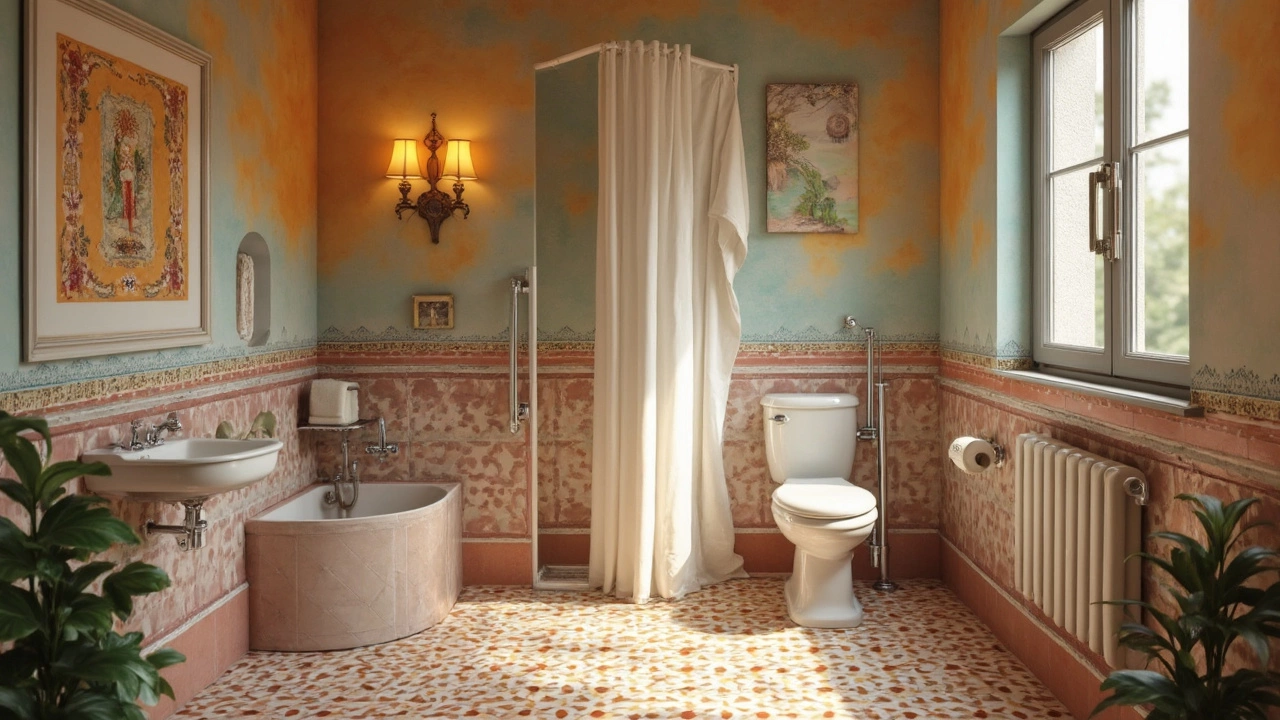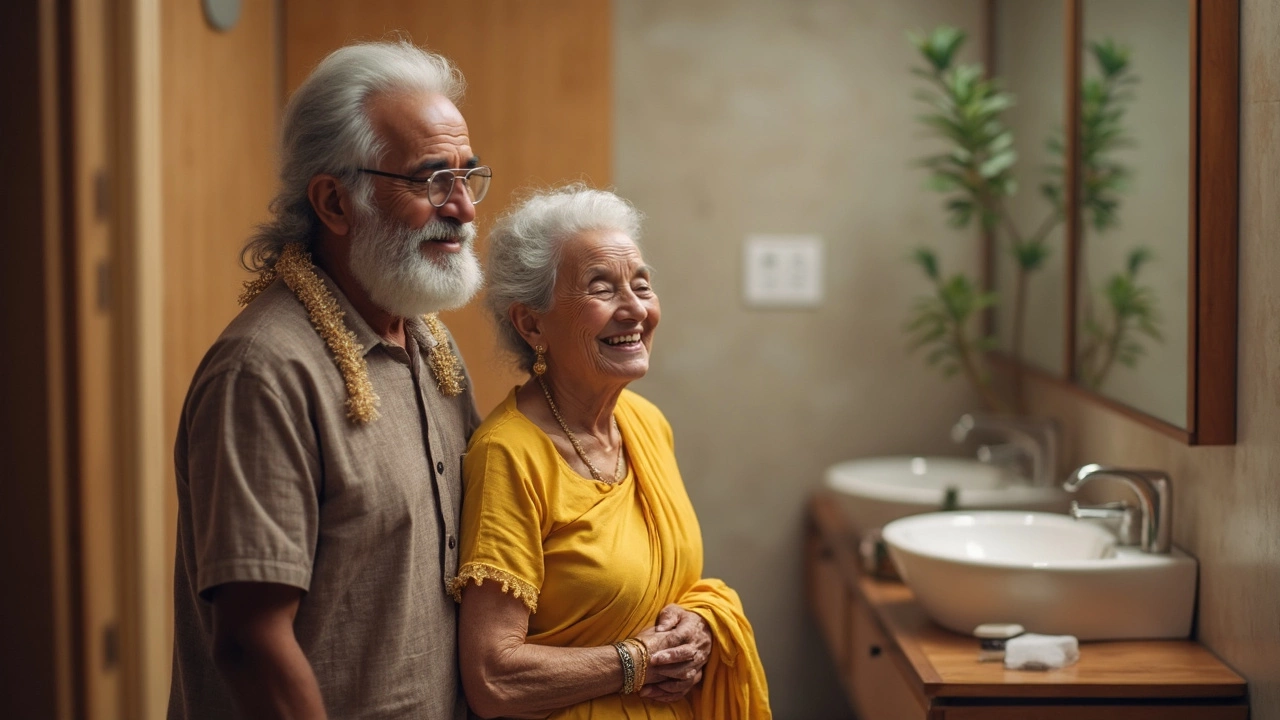Does Medicare Cover Bathroom Remodels for Accessibility?

So, you're wondering if Medicare will help foot the bill for a bathroom remodel? The short answer is - probably not, but it's not all bad news. Typically, Original Medicare doesn't cover home renovations, including making your bathroom more accessible. But hold on, there might be a few workarounds worth checking out.
Medicare Part B might cover durable medical equipment (like a shower chair or commode) if it's deemed medically necessary and you're eligible. Beyond that, some Medicare Advantage plans offer additional benefits that may help with certain modifications, though this is a bit of a grey area and varies by plan.
Ever heard of Medicaid waivers or state-specific programs? These can sometimes help with home accessibility mods for seniors aiming to stay in their homes longer. It varies, but it's worth digging into what's available in your area.
- Understanding Medicare's Coverage
- Exceptions and Assistance Programs
- State-Specific Resources
- Tips for Safe and Cost-Effective Remodels
Understanding Medicare's Coverage
When it comes to Medicare and home modifications, the rules can seem as clear as mud. Typically, Medicare focuses on covering medical expenses like hospital stays and doctor visits, not home renovations. So, does Medicare cover things like a bathroom remodel? Generally speaking, not really. But let's break it down a bit further.
Original Medicare Comes Up Short
Original Medicare, which includes Part A and Part B, does not cover most home improvements. This includes renovations aimed at making your bathroom more suited to mobility needs. The reasoning? Such changes are considered 'home improvements' rather than medical necessities. So, if you're counting on these standard parts of Medicare to fund your new walk-in shower, you might be in for a disappointment.
Where Medicare Part B Helps
Medicare Part B does cover some durable medical equipment (DME), which can include things you might use in the bathroom. For instance, if a doctor orders a shower chair or a walker, Medicare Part B might foot some of the bill. But be aware, Medicare only covers items deemed medically necessary.
Medicare Advantage to the Rescue?
Medicare Advantage Plans, also known as Part C, are offered by private insurance companies. These often provide extra coverage that Original Medicare does not. Some Advantage plans might offer limited benefits for home modifications. It’s not a promise, but checking with your insurance provider could uncover options that help.
| Medicare Component | Coverage Potential |
|---|---|
| Medicare Part A | No coverage for home remodels |
| Medicare Part B | Covers some durable medical equipment |
| Medicare Advantage | Varies by plan; some offer home modification benefits |
A Note on Cost
While it may seem like a lot of hoops to jump through, knowing these details can prevent costly surprises. If you’re set on remodeling, researching other financial options might be necessary. Keep your ears open for programs or insurance plans that step in where Medicare doesn’t.
Exceptions and Assistance Programs
Thinking outside the box can sometimes lead to a goldmine of savings when it comes to bathroom remodels. While Medicare itself typically doesn't fork out the cash for renovations, there are exceptions through different channels and programs that might just ease the burden.
Medicare Advantage Plans
If you're on a Medicare Advantage plan, you might be in luck. Some of these plans offer extra benefits, including home modifications. However, it's not a sure thing and varies by plan, so bust out your paperwork or give your insurance provider a ring to know what's covered.
Medicaid Waivers
Here’s where things get a bit more hopeful. Medicaid often steps up where Medicare falls short, particularly for low-income seniors. Certain Medicaid waivers can cover home modifications, including bathroom remodels aimed at improving accessibility. These waivers aren't available everywhere, so check your state's specific offerings.
State-Specific Programs
Beyond federal programs, many states offer assistance programs aimed at helping seniors modify their homes to age in place. These can range from grant programs to low-interest loans. It's worth reaching out to your local Department of Aging or relevant state agency to explore these options.
Veterans Benefits
If you've served in the military, the Department of Veterans Affairs has programs that might cover home improvements for disabled veterans. The VA offers grants that can significantly lower the financial load of making your home more accessible.
In the realm of accessibility, knowing your options is half the battle won. Whether through Medicare Advantage, Medicaid waivers, or state programs, there are paths to explore. It just takes a little bit of legwork on your part.

State-Specific Resources
When it comes to bathroom remodels and accessibility, the options can vary significantly depending on where you live. Some states offer programs that can help fund or provide low-cost solutions for home accessibility improvements, even if they're not directly covered by Medicare.
Medicaid Waivers
A few states offer Medicaid waivers that might cover home modifications. These aren't universal, so you'll want to check out what your state offers. For example, California has the In-Home Supportive Services (IHSS) program that helps with personal care at home, which can sometimes extend to minor home modifications.
State-Provided Home Assistance Programs
Many states have their own aging services departments that might offer help or guidance. For instance, in New York, the Office for Aging has various programs for independent living aimed at seniors. These may include subsidized loan programs or grants for installing safety equipment at home.
Funding Through Non-Profits
Another route is non-profit organizations. In some regions, groups like Rebuilding Together or Habitat for Humanity might step in to assist with renovations at little to no cost. They'll often work with seniors to make homes safer, including accessible bathrooms.
State Data
In some states, local statistics show a significant number of seniors opting to age-in-place, sparking more resources and programs dedicated to making homes safe. This data often helps advocate for increased funding. Like the 2023 report in Florida indicating a 25% uptick in demand for home modifications, sometimes prompting expanded state aid.
It's a good idea for anyone considering a remodel to start by contacting their local Area Agency on Aging or equivalent. They can provide specifics on available programs, qualifications, and any paperwork you'll need to get the ball rolling.
Tips for Safe and Cost-Effective Remodels
Getting your bathroom remodel just right is crucial, especially when you're looking to enhance accessibility without overspending. Here are some practical tips to keep things both safe and budget-friendly.
Prioritize Safety Features
First off, think about what's non-negotiable for safety. Essential installations like grab bars near the toilet and in the shower can massively reduce the risk of slips and falls. Look for slip-resistant flooring tiles, too; these can be both affordable and lifesaving.
DIY vs. Hiring a Pro
If you're handy, some of these remodel tasks can be DIY projects. Installing grab bars or setting up a handheld showerhead can be done with basic tools. However, for big changes, like adjusting plumbing or installing a walk-in shower, consider a professional. It could save you cash in the long run by avoiding costly mistakes.
Focus on Cost-Effective Updates
Swapping out minor details like taps, levers, or a shower curtain rod can make a huge difference. For bigger changes, you might consider retrofitting your current bathtub with a walk-in model. It’s typically cheaper than a full overhaul.
Leverage Assistance Programs
Be sure to check out local programs that offer financial help for home modifications. Some charities and community organizations provide grants or low-interest loans for folks who need to upgrade their dwellings for health reasons.
Remember, a thoughtful remodel doesn’t just make financial sense; it helps ensure that your home remains a safe and welcoming place as you or your loved ones age.